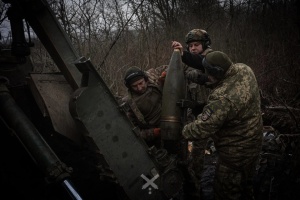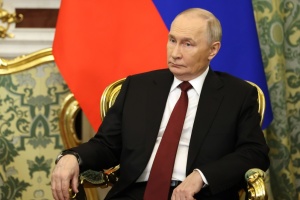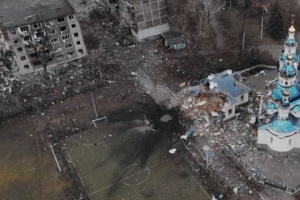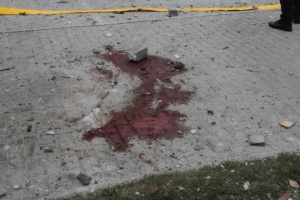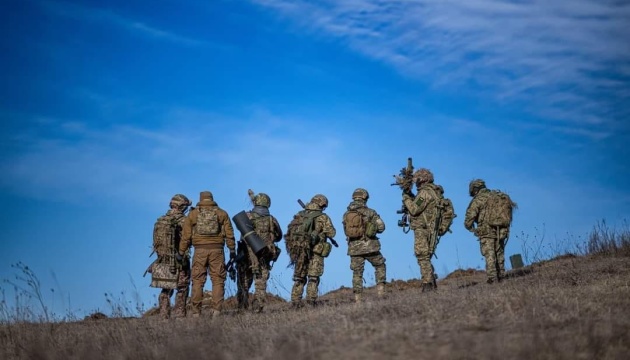
1,000 Days of the Great War: What Lessons We Have Learned About Ourselves, About Our Friends and Our Foes
Behind us are 1,000 days of full-scale war, 24,000 hours of incredible resistance, 1,440,000 minutes during which not only we have been at the forefront of history, but have been creating it. Indeed, behind this heroic fight lies the immense loss and pain: never-ending air raid alerts; the thunder of air defense missiles blasting off skyward to intercept targets; artillery salvos; explosions of missiles, drones, and shells; houses destroyed to ruins; schools, hospitals, cities and villages wiped off the face of the earth, fields mined and clogged with explosive hazards, tens of thousands of killed and crippled; millions of refugees and displaced.
Behind us are 1000 days of full-scale war. Through blood, sweat and tears, we continue proving to all of the world, but first of all to ourselves, that we are a truly mature nation, consolidated and courageous, rather than some “failed state” as someone referred to and portrayed us. Let’s not forget that we were given just three days [to hold out against a Russian invasion], but we took this and have already multiplied it by 333.3. And we will multiply it further, again and again, and the enemy will be “multiplied by zero”. We are getting stronger, more furious, and we are not going to surrender. Victory will definitely be ours.
These 1,000 days behind us –… Let’s try to look into what we have learned about ourselves, about our friends and about our enemy during this time?
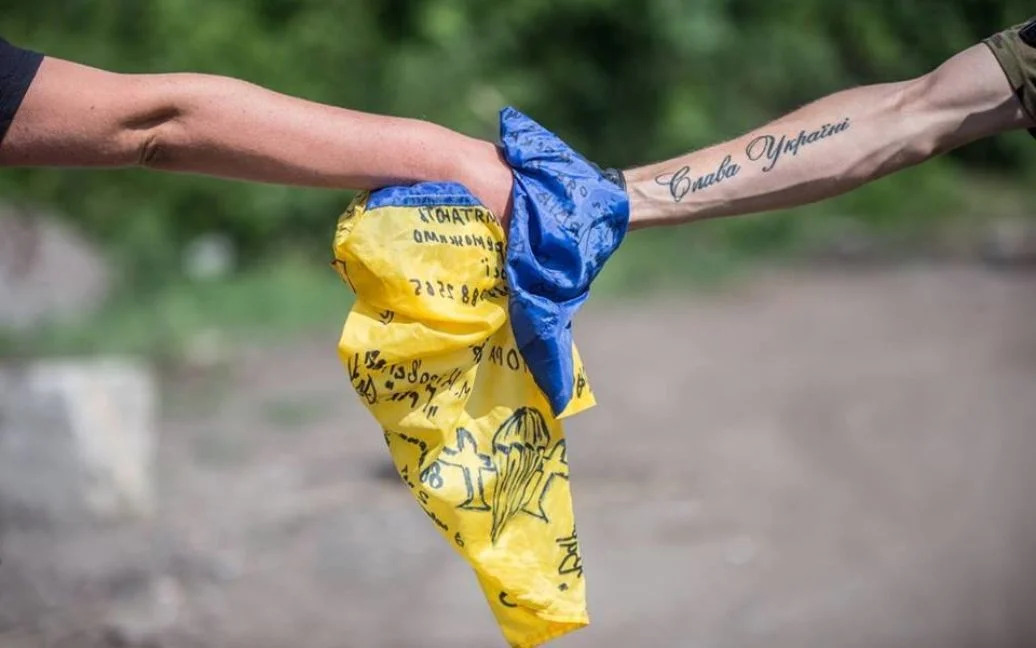
UKRAINE: NEVER BEFORE WE HAVE BEEN AS SELF-CONSCIOUS, MATURE AND STRONG, CAPABLE OF UNITED ACTION AS WE ARE NOW
“We have learned that we had all the time underestimated the level of resilience of the Ukrainian State and the Ukrainian armed forces, as well as Ukrainian citizens. Because if our initial expectations for ourselves and the initial expectations by external observers regarding Ukraine had come true, we would have lost the war as early as in the spring of 2022. But we have been resisting a way stronger aggressor for longer than 2.5 years now,” Pavlo Kazarin, a journalist and acting army officer said in a comment to Ukrinform.
For all the tragedy of the war, he continues, it has had a pretty strong sobering effect on those citizens who believed that the aggressor country could be bargained with.
“It seems that a large proportion of our fellow citizens have understood that the only guarantee of peace is a strong army, security assurances and reliable allies. These are probably the main lessons that we have learned from the 1,000th day of the Great War,” Mr Kazarin added.
Valeriy Pekar, a community leader and professor at the Kyiv-Mohyla Business School believes that, during that time, we have learned that we are a pretty sustainable society, the strength of which lies in horizontal networks of free people.
“Learned that both the Armed Forces and public authorities, local government bodies, and businesses have proven to be fairly resilient to extraordinary trials, meaning that the past 30 years have not been in vain. That our strengths result from the trials we’ve endured in recent centuries: self-reliance and cooperation, flexibility and adaptability, the ability to survive and maintain the normality even in abnormal times. That we are able to unite as a nation across our deep differences and to forget our quarrels for a while,” Pekar emphasized.
“We have learned that the war is going not only somewhere in the East, and that for all these 1,000 days of the Great War, which has lasted for longer than 10 years actually, we were in one boat – all together”, policy analyst Oleh Saakyan adds his comment.
“We have learned that the West, the East, the North and the South are not that far away from each other, not that different. And that where children ride cicles somewhere in the Donetsk region, their peers in Lviv or Ternopil region ride bikes, and in Transcarpathia they ride velos – but at that moment they all ride a bicycle called “Ukraine”, the analyst adds, and continues, “We have learned that for post-Soviet Ukraine, for which someone were looking for a capital in Moscow, there is no capital in Brussels or Washington, but only in Kyiv. And accordingly, no one else in this world takes more interest in loving, protecting and developing Ukraine than the Ukrainians themselves.”
“We learned that we have gone through a crazy path, and we are definitely not ashamed anymore, because we no longer repeat most of the mistakes of the past.
“We learned that the state of Ukraine is needed not by a minority, but by the majority. We received reasons for collective pride, for collective tragedies and despair. We have received a sense of unity. We have become a bit less naive towards the international community and the world, but we still remain romantic.”
We, as a state and society, have already begun asking ourselves difficult questions, trying to distinguish between shades, not just between black and white, Mr Saakyan says.
“But we have not yet learned how to answer these questions. We are living in the mode of over-the-horizon vision, not a strategy. We still need to learn how to live, to plan a long-term strategy that would allow us to distinguish between the main and the secondary, would allow us to be not just side by side, but together, would help create a synergy between the State and society,” the expert emphasizes. “And this is what would enable us to realize the requirement for a new ethics, a new paradigm of the existence of the Ukrainian State, for a new type of relations between a citizen and the State, which again manifested itself in Ukraine’s history against the backdrop of the full-fledge invasion by Russia.”
And this is Ihor Reiterovych, a policy analyst: “We have learned that we really are a nation that is able to unite together not only at times of major crises, but also to learn lessons and safeguard our right to choose which path to develop. On the one hand, we are extremely friendly and peace-loving people; we have always been renowned for our hospitality. Polls since 1991 have consistently revealed that 85-90% of Ukrainians are strongly anti-war. However, when questions about defending our land and loved ones arise, the so-called Cossack spirit revives within us.”
We surprised not only ourselves, but also all of the world. We showed that we know how to and can fight and defeat a far stronger opponent.
“We learned that the shaping of the Ukrainian political nation, which began during the Maidan in 2014, ended a thousand days ago – on February 24, 2022,” Reiterovych believes. “Today it has become already obvious that the Ukrainian nation does exist, that it is far different from the so-called Russian “population”, and that it is precisely a European nation, that values, freedom and independence are the key priorities that are valued more than material benefits. Again, polls show that we are ready to endure whatever difficulties for the sake of victory, because for us the most important thing is to live in a free country, according to our own rules and beliefs.”
Finally, the visioner and director of the Frontier Institute, Yevhen Hlibovytsky, calls this war one of the most conscious experiences for the Ukrainians.
“Never before we have been as self-aware, as mature and strong, capable of a united action as we are today. And this despite the fact that we have room to improve and grow in each of these aspects. I will say it thus: we are the most experienced, but yet inexperienced, we have an old history, but we are very young. It is very important to understand about us, Ukrainians,” the expert emphasized.
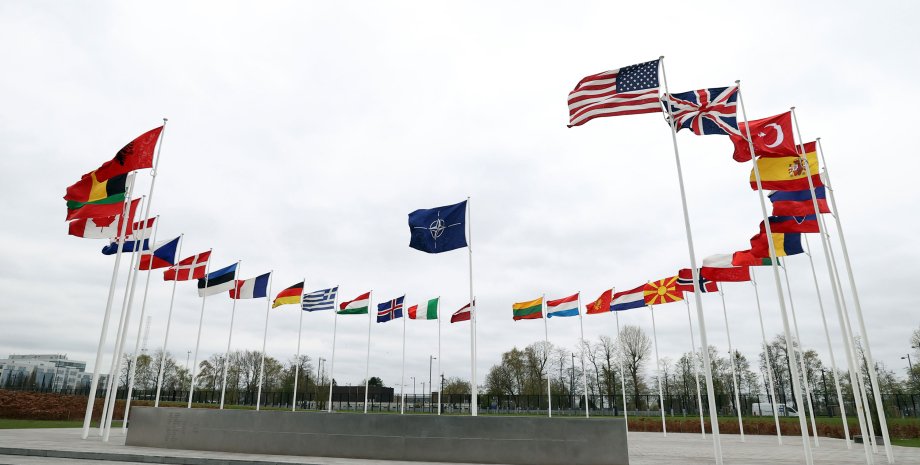
WORLD: OUR PARTNERS PROVED TO BE FAR WEAKER THAN WE THOUGHT, BUT STRONGER THAN THEY THOUGHT
“One thing we learned about friends is that they are not as weak and divided as our enemy would like, but not as strong and consolidated as we would like, that in relations with allies, meaningful efforts should be made long before a war starts, and especially so where it has already got stared,” says Valeriy Pekar.
We learned that the world is guided primarily by interests rather than values, and we must learn to speak that language.
“And we also learned that we are still an unknown entity, not understood, and that our values are not duly appreciated. And we do not know and do not understand many of our existing and potential allies, and even less those who do not belong to the Euro-Atlantic civilization,” he added.
Oleh Saakyan adds that we learned that the civilized world is much weaker than we thought. But, on the other hand, it proved stronger than it thought: “We began learning how to move away from the everyday life’s approach to international politics and to be guided not by judgments, ideas or expectations, but by principles, interests and tasks. Have we learnt it to the full extent? Not yet. But we as a State are learning to do it.”
We saw who are our partners and who are not in the face of the challenges of modernity.
“We saw examples of intelligence, but not determination. Examples of determination, but not intelligence. We, as a society, saw, looking at our Western partners, that adults, too, make mistakes, and we are going through our separation from this. And adults, realizing that something went wrong, may not be as adult as they thought. We were the first to get into the bad storm that is only approaching several of our partners. And this is the unique moment where Ukraine has something to offer the world,” the analyst believes.
Ukraine is capable of doing this and is capable of capitalizing on its experience, skills, and abilities.
“The world looks at us in surprise. It is still surprised. It occasionally gets annoyed because we are inconvenient for them, are inconsistent. In relations with our partners, we have seen what it means to defend our national interest by any and all means. Sometimes even contrary to common sense,” Saakyan says.
Yevhen Hlibovytsky says that we have learned that money and maturity do not mean wisdom: “Learned that mature, wealthy, and strong Western partners can be headless and unreliable. They can also be sincere and loyal, but we expected this sincerity and loyalty from them, but not incompetence.”
Ihor Reiterovych believes that, during these 1,000 days, we have learned an important lesson about our allies. First, we have become convinced that we really have them.
“However, their support sometimes feels like hesitant. The irrational fear of Russia, which is seen among some of our Western partners, has not yet been overcome, even after a thousand days of the all-out war, the expert says, and continues, “Despite significant support, certain “red lines” remain that are difficult to explain logically. It is often the case that our allies themselves cannot give a clear answer as to why they stick to these restrictions.”
At the same time, we see a gradual recognition of our equality and the realization that Ukraine is as much a part of the European community as any other EU country.
“Moreover, perhaps even to a greater extent. After all, our integration into the European Union and NATO is taking place at the cost of Ukrainian blood. This is the highest price that can be paid for freedom and a European future,” Reiterovych emphasizes.
Pavlo Kazarin gives emphasis to the fact that we have learned that different countries respond differently to crises that may not affect them directly. We have seen an unprecedentedly high level of support from the Baltic countries, the Scandinavian countries, and Poland among others.
“That being said, we have seen that, in modern Hungary, for example, national egoism prevails over the awareness of collective values. Whereas before the war many were tempted to put Poland and Hungary into the same basket, now we are aware of the fundamental difference in the approaches to state policies in these two countries,” the journalist noted.
Furthermore, he continues, during this time we have managed to get rid of many of rose-colored glasses. And we managed to understand that our war falls into the optics of citizens in other countries, but, however, does not become the factor which could make them more likely to adjust, let’s say so, their electoral inclinations: “We may be surprised by Donald Trump’s victory in the U.S. presidential elections, despite everything he is saying about our war. But this is yet another reminder for us that, for American voters, our war is not something that can impact on their vote for some or other presidential nominee. We just understood that they are guided by wholly different considerations.”
And looking at our friends, we realize how much time we have wasted: "Say, the Baltic countries, towards which, too, the Russian Federation has aggressive intentions, can feel secured simply because they did not waste time and joined the North Atlantic Alliance, while we, who for a long time could not decide where our capital should be, in Kyiv or Moscow, have now found ourselves alone in the fight with the Kremlin."
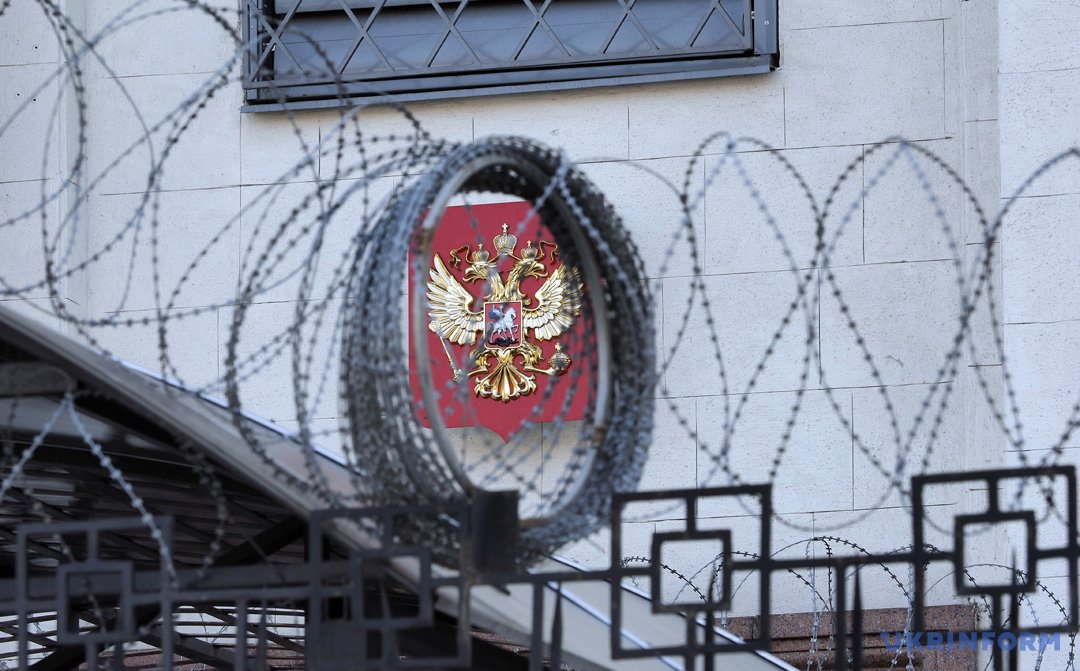
THE ADVERSARY: RUSSIANS, TOO, KNOW HOW TO LEARN, GRIT TEETH AND FIGHT. AND THIS MAKES THEM EVEN MORE DANGEROUS AN OPPONENT FOR US
“Regarding the enemy… I feel that, before the Great War, many were inclined to explain the motives guiding the Russian leaders by referring to corruption first and foremost. The say the Russian leaders choose this policy because they are seeking enrichment, seeking to get their ruling power encapsulated in some way or another, says Pavlo Kazarin. But in fact, he continues, this is yet another indication of our underestimation of how much obsessed people can be with misanthropic, hateful ideas. And, hypothetically speaking, the people whom we perceived to be thieves actually proved to be murderers. And this is another argument explaining that corruption and these mercantile yet reasonable interests are not always the factors that explain the nature and implications of human actions.”
Secondly, we realized that sanctions do not work as they are intended, that all these package after package, severe restrictions, on which we pinned so much hopes at the inception of the war, could not bring the hostile economy to a collapse simply because it relies for support on powers such as China and India.
“And the modern world is not a world where Western economies dominate, where they, by imposing restrictions, can force anyone into adhering to some or other policy. In the world, there are several centers of economic influence, Delhi and Beijing among them. And as long as these centers of economic influence do not want to, no country in the world will be left alone or in severe economic isolation,” he added.
Thirdly, we saw that we again found ourselves in the first half of the 20th century, where the world was organized along axes.
“In this world, there are axes of evil which cooperate with each other – Iran, North Korea, the Russian Federation, and China, the latter supporting them all to make sure that this expanse of market-based (or not quite so, as in the case of the DPRK) dictatorships can resist against market-based democracies. And I believe that, whereas the 20th century was an expanse where market-based democracies were competing with the dictatorships based on centralized economic planning, then the 21st century will most likely be an expanse where the competition will be between market-based democracies and market-based dictatorships. And there is a suspicion that the list of conflicts in this century will not be limited to our war,” says Mr Kazarin.
Valeriy Pekar adds his comment that Ukraine has realized that its opponent is fundamentally not ready to recognize our existence. That the opponent really believes in its own misconceptions about the inauthenticity of the Ukrainian nation and its claims to an independent nationhood.
“The adversary does not have a picture of the future, just a picture of the past; the adversary has vulnerabilities and strengths of its own. This all should have been researched in peacetime, but we did not do this. We realized that we are confronted by the same old empire, which can change names or flags, but cruelty, disregard for the lives of the people of their own and of others, a total lie remain in place. That the empire consists of dozens of different peoples and identities that could bring it to collapse, if we help, and then Ukraine will receive a lasting peace,” the Kyiv-Mohyla Business School professor is convinced. Yevhen Hlibovytsky, for his part, says that, our adversary, with all its worst traits, knows how to be adaptive and flexible: “We learned that our enemy, too, knows how to learn, grit teeth and fight. And this makes it even more dangerous an opponent for us. Our enemy knows how to be smart and resourceful. Accordingly, it can transform itself along the war. And therefore we should not treat the enemy with contempt and frivolity, because otherwise we risk underestimating it and being defeated due to this underestimation.”
Oleh Saakyan agrees: “We learned that the price of both underestimating and overestimating the enemy is equally heavy. It is important to know really well who it is. We learned that short historical memory comes at a price to pay. We must not forget who our neighbor is.”
And we also learned why our folklore culture contains that many episodes about Muscovites.
“Having failed to heed the voice of history, we chose to step on the same rake, failing to understand that the experience of past generations is worthy of being listened to. We have become convinced that Russians know how to learn. That said, the same old mistakes and weaknesses that were inherent in them remain in place. We learned what we had well forgotten, that Russia can be defeated. And we demonstrated this to the world. We learned that not only Ukraine is not Russia, but Ukrainians are not Russians. Finally, to paraphrase Golda Meir, we learned that the Russians hate us more than they love their own children,” Oleh Saakyan emphasizes.
Russia’s full-scale invasion shattered any illusions about our enemy, argues Ihor Reiterovych: “Even after the events of 2014, many tried to divide Russians: there are the authorities, there are Putinists, and there are “good Russians” who are opposing the war. However, the 1,000 days of the Great War showed that there are very few such people. The vast majority [of the Russian population] either vigorously support the invasion or silently agree with it.”
Even those who fled abroad did so mostly not because they condemned the war, but because they were scared of being conscripted for war. And now they are surprised over why they are approached with mistrust and antipathy in the West.
“These 1,000 days have exposed a deep problem in the Russian society – its resentment and imperial ambitions. We have learned that this is not a nation striving for peace and development, but just a mass of people living with illusions of grandeur and the hatred of everything foreign,” the analyst comments. “Their rhetoric and thinking got stuck in the past centuries, when territorial conquests and war aggression were perceived as the norm. They are easily manipulated and readily accept militaristic propaganda aimed at justifying aggression and violence.”
Ultimately, we have learned that this shift in the perception of Russia is taking place not only in Ukraine, but also globally.
“The fascination with Russian culture, art and literature is gradually losing its appeal, and more and more people are realizing the true essence of modern Russia. Russia’s return to the club of civilized nations will be a long and difficult process. This is not just a matter of a change of ruling regime; it is more about a profound transformation of society, its values and views. Whereas it took a few decades for Germany to restore its reputation after World War II, for Russia, this path will be far longer. The reasons and conditions for this war to begin are much deeper and far more destructive than those in the case of Nazi Germany,” Mr Reiterovych said in conclusion.
Myroslav Liskovych. Kyiv

